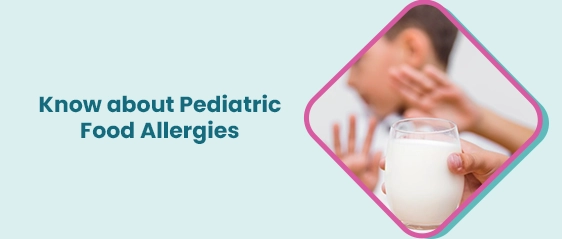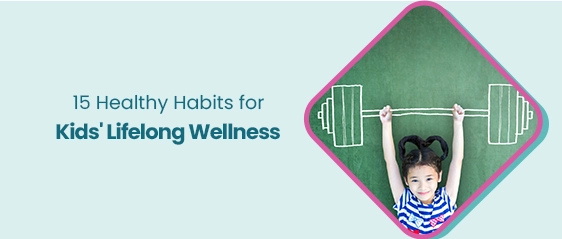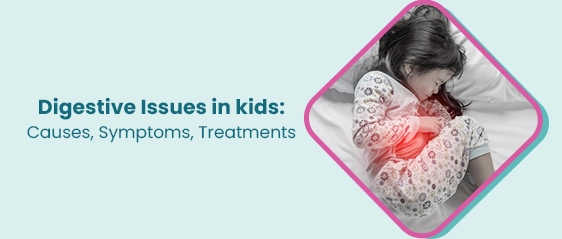
Know About Pediatric Food Allergies
- 14 Aug 2023
Pediatric food allergies are a growing concern that affects millions of children worldwide. As a parent or caregiver, understanding the intricacies of these allergies is crucial for ensuring your child's safety, well-being, and quality of life. In this comprehensive guide, we will delve into the world of pediatric food allergies, exploring their causes, symptoms, diagnosis, management, and ways to create a safe environment for your child.
Understanding Pediatric Food Allergies
Pediatric food allergies occur when a child's immune system reacts abnormally to certain proteins in food. This immune response can range from mild discomfort to severe reactions that could be life-threatening. Common allergens include milk, eggs, peanuts, tree nuts, soy, wheat, fish, and shellfish
Recognizing Symptoms
Paediatric food allergies can cause a wide range of symptoms. Hives, itching, and a runny nose are examples of mild reactions. More severe responses may include trouble breathing, swelling of the face and neck, and even anaphylaxis, a severe allergic reaction that necessitates emergency medical assistance.
Diagnosis and Testing
If you suspect your child has a food allergy, consult a pediatrician or allergist. They will take a detailed medical history and may recommend tests such as skin prick tests or blood tests to identify specific allergens. These tests help pinpoint trigger foods and guide appropriate management strategies.
Managing Pediatric Food Allergies
- Avoidance: The primary management strategy for pediatric food allergies is to avoid trigger foods. Read food labels carefully, educate caregivers, and inform schools about your child's allergies.
- Emergency Action Plan: Work with your child's doctor to create an emergency action plan detailing steps to take in case of accidental exposure. This often involves the use of epinephrine (EpiPen) to treat severe reactions.
- Nutritional Balance: Consult a pediatric dietitian to ensure your child receives adequate nutrition despite avoiding allergenic foods. They can guide you in finding suitable alternatives.
- Educating Caregivers: Teach family members, teachers, babysitters, and friends about your child's allergies, symptoms, and how to respond in case of an emergency.
- Allergy-Free Environment: Create a safe space at home by separating allergenic foods and regularly cleaning surfaces. Consider allergen-free zones to reduce cross-contamination.
Supporting Your Child
- Open Communication: Maintain open and honest communication with your child about their allergies. Teach them to recognize symptoms and empower them to make safe food choices.
- Social Situations: Educate your child about their allergies, so they can confidently communicate their needs in social settings like playdates, parties, and school.
- Emotional Well-being: Pediatric food allergies can impact a child's emotional well-being. Support your child by fostering a positive outlook and connecting them with support groups if needed.
The Future of Pediatric Food Allergies
Research is ongoing, and advancements are being made in managing and even preventing pediatric food allergies. Experimental therapies and early allergen introduction are areas of active exploration, offering hope for improved quality of life for affected children.
Conclusion
Navigating pediatric food allergies requires vigilance, education, and a strong support network. By understanding the causes, symptoms, diagnosis, and management strategies, you can create a safe environment where your child can thrive. Stay informed, work closely with healthcare professionals, and empower your child to confidently manage their allergies as they grow and develop. With the right knowledge and preparation, you can ensure that your child's journey is filled with health, happiness, and the freedom to explore the world around them
When it comes to your child's health, trust in the expertise of Medicover Hospitals ' dedicated pediatricians. With a commitment to providing exceptional care for infants, children, and adolescents, our pediatric specialists offer a comprehensive range of services to ensure your child's well-being at every stage of development.
Frequently Asked Questions
1. What are pediatric food allergies?
Pediatric food allergies are immune responses to certain proteins in foods. When a child's immune system reacts abnormally, it can cause symptoms ranging from mild discomfort to severe reactions.
2. What are common allergenic foods for children?
Common allergenic foods include milk, eggs, peanuts, tree nuts, soy, wheat, fish, and shellfish. These foods can trigger allergic reactions in susceptible individuals
3. What are the symptoms of pediatric food allergies?
Symptoms can vary but may include hives, itching, swelling, vomiting, diarrhea, runny nose, coughing, wheezing, and in severe cases, anaphylaxis (a life-threatening reaction).
4. How are pediatric food allergies diagnosed?
Pediatric allergists diagnose food allergies through medical history, physical exams, and allergy tests such as skin prick tests and blood tests to identify specific allergens.
5. What is anaphylaxis?
Anaphylaxis is a severe and potentially life-threatening allergic reaction that requires immediate medical attention. Symptoms may include difficulty breathing, swelling of the face and throat, rapid heartbeat, and low blood pressure.
6. Can pediatric food allergies be outgrown?
Some children may outgrow their food allergies, especially allergies to milk, eggs, soy, and wheat. Allergies to peanuts, tree nuts, fish, and shellfish tend to persist into adulthood.
7. How can I prevent accidental exposure to allergens?
Prevent accidental exposure by reading food labels carefully, educating caregivers, communicating with schools, and ensuring that your child knows how to avoid allergens
8. What should I do in case of an allergic reaction?
If your child experiences an allergic reaction, follow their emergency action plan, which might involve administering epinephrine (EpiPen) if prescribed, and seeking immediate medical help.
9. Can children with food allergies have a balanced diet?
Yes, with proper planning and guidance from a pediatric dietitian, children with food allergies can have a balanced diet by incorporating safe and nutritious alternatives to allergenic foods.
10. How can I educate my child about their food allergies?
Educate your child about their allergies from an early age using age-appropriate language. Teach them to recognize symptoms, read ingredient labels, and communicate their needs to others.
11. Are there experimental therapies for pediatric food allergies?
Yes, there are experimental therapies being explored, such as oral immunotherapy and sublingual immunotherapy, which aim to desensitize allergic individuals to specific allergens.
12. Should I inform my child's school about their food allergies?
Absolutely. Inform the school, teachers, and staff about your child's food allergies. Work together to create an allergy management plan that includes emergency procedures and safe food options.
13. Can my child participate in social events and activities with food allergies?
Yes, with proper planning and communication, your child can participate in social events. Educate them to advocate for their safety, and inform event organizers about their allergies.
14. Are there support groups for families dealing with pediatric food allergies?
Yes, there are many support groups and online communities where parents can connect, share experiences, and exchange advice on managing pediatric food allergies.
15. What steps can I take to prevent pediatric food allergies in my child?
While prevention isn't always possible, early introduction of allergenic foods under medical guidance and breastfeeding (when possible) have been suggested as potential ways to reduce the risk of allergies.




